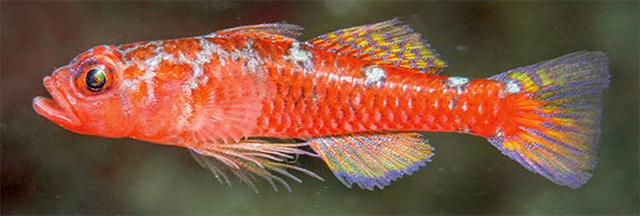| Gobiidae (Gobies), subfamily: Gobiinae |
| 3.5 cm SL (male/unsexed) |
|
reef-associated; marine; depth range - 70 m |
| Western Pacific: Chesterfield Banks and New Caledonia to Samoa. Reported from the Ryukyu Islands (Ref. 559). Resembles Trimma naudei and Trimma okinawae (Ref. 1602). |
|
Dorsal spines (total): 7-7; Dorsal soft rays (total): 7-8; Anal spines: 1-1; Anal soft rays: 8-9. Diagnosis: frontal ridge behind the orbits slopes steeply into a wide interorbital trench
anteromedially, and into postorbital trenches laterally; posterior nasal opening separate from anterior margin of eye; elongate first dorsal spines absent; fifth pelvic fin ray branched once
dichotomously; body red-orange with four white dorsolateral spots between caudal region and origin of second dorsal; no white ventrolateral spots; facial pattern with two thin, diffuse white diagonal lines under orbit and one over preopercle (Ref. 57688). |
| Inhabits clear lagoon and seaward reefs; within crevices and caves of mostly dead coral rock and sandy rubble bottom (Ref. 9710, 57688). Solitary (Ref. 90102). |
|
Least Concern (LC); Date assessed: 07 September 2021 Ref. (130435)
|
| harmless |
Source and more info: www.fishbase.org. For personal, classroom, and other internal use only. Not for publication.
